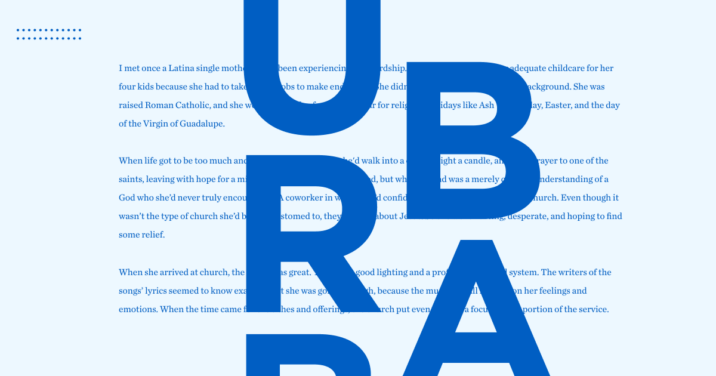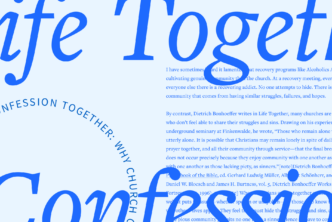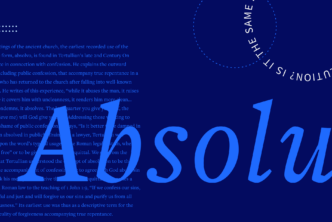I met once a Latina single mother who’d been experiencing real hardship. She was unable to pay for adequate childcare for her four kids because she had to take on two jobs to make ends meet. She didn’t come from a very religious background. She was raised Roman Catholic, and she went to church a few times a year for religious holidays like Ash Wednesday, Easter, and the day of the Virgin of Guadalupe.
When life got to be too much and she felt overwhelmed, she’d walk into a church, light a candle, and say a prayer to one of the saints, leaving with hope for a miracle. She thought she knew God, but what she had was a merely cultural understanding of a God who she’d never truly encountered. A coworker in whom she’d confided her problems invited her to church. Even though it wasn’t the type of church she’d been accustomed to, they did talk about Jesus. So she went hurting, desperate, and hoping to find some relief.
When she arrived at church, the music was great. There was good lighting and a professional sound system. The writers of the songs’ lyrics seemed to know exactly what she was going through, because the music was all focused on her feelings and emotions. When the time came for the tithes and offerings, the church put even more of a focus on this portion of the service. They promised that if she would just “sow a seed” into this ministry and have enough faith, her prayers would be answered—because Scripture said in Mark 4:8 that God would repay her up to thirty, sixty, or even a hundredfold if she’d just have enough faith. When she gave that night, she gave much more than she was able to, believing that God would solve her financial problems.
But the return on her “investment” never came in. All she was left with was a resentment towards God for having defrauded her. How could he do her like that, knowing she was in a financial bind?
A common story
This type of story is all too familiar in many neighborhoods of the United States, but even more so in the hoods of America, meaning the inner city or urban communities—communities commonly inhabited by ethnic minorities. There are churches that run rampant promoting a gospel of prosperity which in fact is no gospel at all. They promote Jesus as a financial Savior, and they twist Scripture more than a churro to do so. Their real goal is to fleece Christ’s flock.
These communities are desperate for solid, Bible-believing, Scripture-preaching pastors who are more concerned with offending a holy God than offending people’s feelings. Many of these communities—like the one I live in—have a huge need for biblically sound churches that do not compromise basic biblical truths for the sake of pleasing people.
I pray this doesn’t come across as angry. It’s just tough to not see more efforts and resources being poured into communities like mine. The hood desperately needs more doctrinally sound and gospel-centered churches—the kinds of churches that so many other, more affluent communities have benefited from for decades.
Half-steppin’
Tim Keller says what I have seen, that “there is no more powerful way to reach a city with the gospel than to plant new churches in it.” The best way to bring more doctrinally sound churches to needy areas is to make a concerted effort toward urban church planting. There is much focus on overseas and global missions, but there is so very little along the lines of local missions. There is lots of focus on jungle areas and rainforests, but not much on the concrete jungles of major metropolitan communities. In the words of 80s rapper Big Daddy Kane: “Ain’t no half-steppin’”—and we should take heed to that message when it comes to ministry, especially urban ministry. Let’s not “half-step” our mission goals and focus only on overseas and foreign countries; let’s also include our neighbors.
The hoods of our country need the gospel. Not the one that teaches health and wealth, but the only true gospel, the one that tells us about Jesus. The same Jesus who lived a perfect life we never could, who died a death that was meant for us, who paid a debt we could never afford, so that if we’d believe we’d be saved (Rom 10:9). The Jesus that is the second person of the holy Trinity; the Jesus that is of the very same essence of God, who in fact is God (John 1:1). This is the message that needs to be told in every church.
But unfortunately, in many under-resourced communities, this is not the message being taught.
Urban ministry
As a “hood” church planter, I am fully aware of all the extra layers of difficulty involved with starting a new church in urban areas. One of the many problems associated with inner city neighborhoods is the lack of resources, so money is always an issue. But if it didn’t stop tentmaker Paul, then it shouldn’t stop us either, right?
For those church planters that are denominationally affiliated or connected to a network, there is usually some form of financial support. But even then, there is usually an outdated structure that goes something like this: support of x dollars for the first year, then approximately half of x for year two, and then a quarter of x for year three. If by year four the church plant is not yet self-sufficient, it will be deemed a failure and closed down for lack of success—success measured in dollars or persons. But a church’s success should not be made strictly on whether or not it can support itself. Leaders must also consider discipleship and spiritual growth.
I am not saying that there aren’t healthy Bible teaching churches found in the hoods of America. What I am saying is that there is such a huge need for many, many more. I’m a church planter on the urban front lines. I am bi-vocational, and I am totally okay with having to work a full-time job as well as raise funds to cover our church’s budget. But it would be so much better and so much easier if I could focus on discipleship and outreach instead of working a separate job and fundraising. I often think of how much more kingdom work I could do in the community where I live and minister.
A challenge for you
I have a challenge for those reading this article. Would you consider looking into supporting local missions engagement by way of partnering with a solid, doctrinally healthy, gospel-centered urban church in your area? Would you consider adding a line item to your budget? It is not easy doing ministry in communities that are plagued with gang violence, drug addiction, prostitution, and a high rate of single-parent homes. Would you consider bringing this to your missions board?
A large percentage of the church planters being raised up to serve in these communities is indigenous to these neighborhoods, which is amazing! But on the downside, since many of these leaders are from these very same communities, they too struggle with those issues that are common there. Many have a limited education and face financial hardship, which makes it almost impossible to get a seminary education from an accredited school. And if a given church planter has completed seminary education and obtained an MDiv degree, that pastor will serve a church that does not have enough money to provide a full-time salary. What happens now is that they’ve accumulated a large amount of student loan debt, debt that was necessary to get an education to get a job that doesn’t pay well. At least that has been my very own experience! So it’s like a catch-22: a pastor needs an expensive education in order to get a job that doesn’t pay off the debt created by that education. Crazy, right?
As a year has just come to a close and a new one crests the horizon, what would it look like if more and more established churches would partner with new churches being planted in really hard places? What would it look like to be on mission together for the sake of reaching the last, the least, and the lost? How great of a message would it send to see different churches, especially those of different ethnicities and cultures co-laboring for the sake of the gospel? Think of the witness to see churches who are solid on the primary issues of Christianity, but perhaps differing views on secondary or tertiary issues, working together to spread the gospel? That would be a picture worthy of framing and sending to God, right?
***
Further resources
Hopeful Realism in Urban Ministry: Critical Explorations and Constructive Affirmations of Hoping Justice Prayerfully
Regular price:






